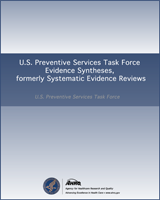NCBI Bookshelf. A service of the National Library of Medicine, National Institutes of Health.
This publication is provided for historical reference only and the information may be out of date.
Structured Abstract
Background:
Lung cancer is the leading cause of cancer-related death in the United States and worldwide. No major professional organizations, including the U.S. Preventive Services Task Force (USPSTF), currently recommend screening for lung cancer.
Purpose:
To examine the evidence evaluating screening for lung cancer with chest x-ray, sputum cytology, and low-dose computerized tomography (CT) to aid the USPSTF in updating its recommendation on lung cancer screening.
Data Sources:
MEDLINE®, the Cochrane Library, reviews, editorials, and experts.
Study Selection:
Studies that evaluated mass-screening programs for lung cancer involving the tests of interest. All studies were reviewed, but only studies with control groups were rated in quality since these would most directly influence the USPSTF screening recommendation.
Data Extraction:
Data were abstracted to data collection forms. Studies were graded according to criteria developed by the USPSTF.
Data Synthesis:
None of the 6 randomized trials of screening for lung cancer with chest x-ray alone or with sputum cytology have been shown to benefit those screened. All studies were limited by some level of screening occurring in the control population. Five case-control studies from Japan have suggested benefit to both high- and low-risk men and women. All studies are limited by potential healthy screenee bias. Six cohort studies evaluated screening CT and showed that when CT is used to screen for lung cancer, lung cancer was diagnosed at an earlier stage than in usual clinical care. However, these studies did not have control groups, making mortality evaluation difficult. In addition, the studies demonstrated a high rate of false-positive findings.
Conclusions:
Current data do not support screening for lung cancer with any method. These data, however, are also insufficient to conclude that screening does not work, particularly in women. Two randomized trials of screening with chest x-ray or low-dose CT are currently underway and will better inform lung cancer screening decisions.
Contents
Prepared for: Agency for Healthcare Research and Quality, U.S. Department of Health and Human Services.1 Contract No. 290-97-0018, Task No. 2. Technical Support of the U.S. Preventive Services Task Force. Prepared by: Oregon Health & Science University Evidence-based Practice Center, Portland, OR 97239.
This report may be used, in whole or in part, as the basis for development of clinical practice guidelines and other quality enhancement tools, or a basis for reimbursement and coverage policies. AHRQ or U.S. Department of Health and Human Services endorsement of such derivative products may not be stated or implied.
AHRQ is the lead Federal agency charged with supporting research designed to improve the quality of health care, reduce its cost, address patient safety and medical errors, and broaden access to essential services. AHRQ sponsors and conducts research that provides evidence-based information on health care outcomes; quality; and cost, use, and access. The information helps health care decisionmakers—patients and clinicians, health system leaders, and policymakers—make more informed decisions and improve the quality of health care services.
- 1
540 Gaither Road, Rockville, MD 20850. www
.ahrq.gov
- Review Lung cancer screening with sputum cytologic examination, chest radiography, and computed tomography: an update for the U.S. Preventive Services Task Force.[Ann Intern Med. 2004]Review Lung cancer screening with sputum cytologic examination, chest radiography, and computed tomography: an update for the U.S. Preventive Services Task Force.Humphrey LL, Teutsch S, Johnson M, U.S. Preventive Services Task Force. Ann Intern Med. 2004 May 4; 140(9):740-53.
- Review Screening for Skin Cancer in Adults: An Updated Systematic Evidence Review for the U.S. Preventive Services Task Force[ 2016]Review Screening for Skin Cancer in Adults: An Updated Systematic Evidence Review for the U.S. Preventive Services Task ForceWernli KJ, Henrikson NB, Morrison CC, Nguyen M, Pocobelli G, Whitlock EP. 2016 Jul
- Review Aspirin Use in Adults: Cancer, All-Cause Mortality, and Harms: A Systematic Evidence Review for the U.S. Preventive Services Task Force[ 2015]Review Aspirin Use in Adults: Cancer, All-Cause Mortality, and Harms: A Systematic Evidence Review for the U.S. Preventive Services Task ForceWhitlock EP, Williams SB, Burda BU, Feightner A, Beil T. 2015 Sep
- Review Screening for Colorectal Cancer: An Updated Systematic Review[ 2008]Review Screening for Colorectal Cancer: An Updated Systematic ReviewWhitlock EP, Lin J, Liles E, Beil T, Fu R, O'Connor E, Thompson RN, Cardenas T. 2008 Oct
- Review Low-Dose Aspirin for the Prevention of Morbidity and Mortality From Preeclampsia: A Systematic Evidence Review for the U.S. Preventive Services Task Force[ 2014]Review Low-Dose Aspirin for the Prevention of Morbidity and Mortality From Preeclampsia: A Systematic Evidence Review for the U.S. Preventive Services Task ForceHenderson JT, Whitlock EP, O'Conner E, Senger CA, Thompson JH, Rowland MG. 2014 Apr
- Lung Cancer ScreeningLung Cancer Screening
- SRS4899924 (1)SRA
- Schizanthus hookeri maturase K gene, partial cds; chloroplastSchizanthus hookeri maturase K gene, partial cds; chloroplastgi|2046414948|gb|MT262942.1|Nucleotide
- Alyssum diffusum subsp. diffusum voucher SAV:58STE internal transcribed spacer 1...Alyssum diffusum subsp. diffusum voucher SAV:58STE internal transcribed spacer 1, partial sequence; and 5.8S ribosomal RNA gene and internal transcribed spacer 2, complete sequencegi|1922226751|gb|MW187015.1|Nucleotide
- Sphenostemon lobosporus isolate A54 ribulose-1,5-bisphosphate carboxylase/oxygen...Sphenostemon lobosporus isolate A54 ribulose-1,5-bisphosphate carboxylase/oxygenase large subunit (rbcL) gene, partial cds; chloroplastgi|530444071|gb|KF496342.1|Nucleotide
Your browsing activity is empty.
Activity recording is turned off.
See more...

